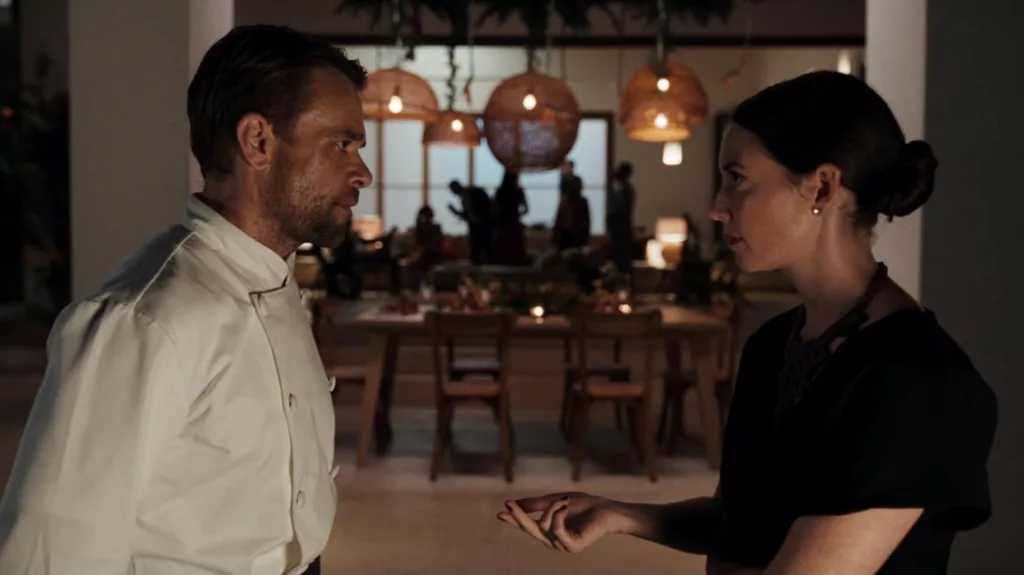Nicholas Tomnay’s What You Wish For leads us down an unsettling path. It starts simply enough, with Ryan seeking refuge from troubles at home. But after reconnecting with his friend Jack in a lavish tropical setting, Ryan’s envy starts growing.
Things take a dark turn when opportunity comes knocking, though the price may be higher than he bargains for. As Ryan slips deeper into his role, disturbing truths unfold about power, greed, and survival. Though not perfect, What You Wish For grips us with its atmosphere of creeping dread.
Through it all, Nick Stahl grounds the narrative as our desperate protagonist. While some critique predictable moments, Tomnay overall crafts an intense moral thriller guaranteed to leave reflection in its wake. Now let’s dive into what unfolds for Ryan in this disturbing South American locale.
Entangled Ambitions
At its center, What You Wish For is about ambition—both its allure and its risks. We meet Ryan, a tired chef stuck in a rut. Though talented, gambling debts have him on the run. He seeks refuge with Jack, a former colleague living large thanks to a mysterious catering gig. Ryan’s worn down, but Jack’s lavish lifestyle lights a flame under him.
Jack, though, isn’t all he appears to be. He clings to a haunted air. Ryan’s jealous gaze misses the unease in his eyes. When tragedy strikes, Ryan acts on impulse, assuming Jack’s identity. Here he finds opportunity—a way to shed old burdens and seize the life he envied. But little does Ryan realize the cost of such rewards or the darkness that forged them.
Ryan, Nick Stahl brings nuance to a brash choice. His performance conveys a driven man nursing desperate hopes. When grim truths emerge, Stahl masterfully charts Ryan’s descent as he resolves cracks under mounting collateral. He anchors the subtle questions at the film’s core: how far might any of us go for success, and which lines could we rationalize crossing given the right push?
These depths are matched by fellow players like Imogen, Jack’s enigmatic employer. Played with chilling polish by Tamsin Topolski, she represents the removed calculation that built their business on the backs of others. Yet for all its societal jabs, What You Wish For falls short of exploring such layered themes in a truly striking way. Ryan and Imogen feel more like tools for propelling an intriguing setup than fleshed-out characters anchoring deeper insights.
Still, there’s no denying that the film wraps us in an unsettling atmosphere of creeping dread. Beneath picturesque surfaces, it hints at survival coming with strings attached. What You Wish For may not linger, but it offers just enough to spark discussion on ambition’s many faces and those who enable its more compromising forms to flourish. At its best, it leaves an aftertaste of moral ambiguity long after the closing credits roll.
A Dreadful Undertone
Nicholas Tomnay left his mark on What You Wish For with a keen sense of pacing and tone. From the off, he draws us into an uneasy world through visuals. The slick cinematography of Mateo Guzman Sanchez makes even scenic backdrops feel disquieting. Wide shots invite our gaze, only for it to linger on discomforting details.
Light and framing are key tools for enhancing the film’s unsettled atmosphere. Tomnay brings an artful appreciation for the subtleties of human expression. His camera lingers thoughtfully on Ryan’s face as private worries come to the fore. In contrasting close-ups, we view other characters’ veiled intentions behind masks of charm. Empty grins and fleeting looks tell another story between carefully chosen words.
This blending of styles is another Tomnay trademark. What You Wish For balances on a razor’s edge between grindhouse thrills and scathing social satire. Violent twists arrive with chilling nonchalance, playing the absurd for dread rather than laughter. Yet sprinkled throughout is a sharp, irreverent wit. Clever ironies and innuendos punctuate proceedings, earning morbid chuckles amid mounting discomfort.
All build to a chilling crescendo through score and design. Jeff Russo and Tracie Turnbull’s string strains summon rising tides of concern. Their melodies mirror Ryan’s fraying nerves, catching us off guard with swelling panic. In the production, every meticulous detail, from costume to lighting, subtly enhances the foreboding atmosphere.
What emerges is a deeply unsettling watch, yet one tempered with sly humor. Tomnay guides us masterfully through shifting tones. We laugh nervously at moments while our skin crawls at others. His methods ensure What You Wish For lodges disturbingly in the mind long after final credits. Even if its social musings prove lighter than hoped, the film proves a troubling thriller through its unsettling undertaking.
Holding it Together
Nick Stahl takes on the monumental task of anchoring What You Wish For as Ryan, and he rises admirably to the challenge. From the first, Ryan is a bundle of nerves barely kept beneath the skin. You see it in Stahl’s restless eyes and twitchy energy—the constant scan for any threat or opportunity. Desperation has long been his companion, as debts and danger hound his steps.
Yet Stahl ensures we glimpse flickers of the man Ryan had been and could yet be again. When joking with Jack, we see fleeting moments where his face and form relax into honest levity. It’s in these flashes that Stahl’s abilities as an actor truly shine—to craft a character so complexly layered with nuance. Beneath Ryan’s fraying nerves lie dignity and drive, still fighting on. Stahl imbues him with flashes of empathy that keep us rooting as his moral compass spins ever further off course.
As Ryan’s schemes mount taller, so too does the pressure on Stahl’s shoulders. He continually rises to meet each new challenge, twisting and contorting Ryan’s slippery morality with persuasive ease. His physique and bearing shift seamlessly to inhabit not just Ryan but the personas he adopts. When his deception crashes down, Stahl’s devastated gaze says it all—this man has been stretched to breaking, and then some further still.
Throughout the murkiest turns, Stahl ensures our eyes remain fixed on Ryan. His controlled, visceral performance anchors our experience of this harrowing story. In Ryan, Stahl has crafted one of the most complexly compelling characters that the screen has seen in some time. He holds it all together with nuance, grit, and raw humanity that elevates What You Wish For above its limitations. When the credits roll, it is Stahl’s indelible Ryan we carry with us the longest after all else fades.
Pushing Boundaries, Playing It Safe
What You Wish For sets out to explore timely ideas around ambition, morality, and social class. The film draws comparisons to The Menu and Parasite for critiquing how the rich exploit and control those with less power. Director Nicholas Tomnay clearly aims to push boundaries in dissecting these complex issues.
Ryan’s desperation sees him cross line after line in chasing wealth and success. As the truth about Jack’s lifestyle is revealed, we see how brutal those at the top will be to maintain power. Imogene and Maurice represent ruthless elites for whom human cost is but collateral damage. Their nonchalant monologues hint at darker realities that some wish were unseen.
Where the film gets interesting is in dissecting Ryan’s steady unraveling. Well-acted by Nick Stahl, he conveys a man stretched to breaking by circumstance and his own flawed character. Scenes depicting his scramble feel visceral and real. We sympathize with the drive pushing him yet abhor the means by which he tries to achieve it. Tensions created as his schemes mount still entertain, even as purpose grows muddled.
However, as plot twists pile on, What You Wish For loses its bite. Comparisons to sharply scripted fare like The Menu or Parasite only highlight where original ideas are lacking. Twists become ever less plausible, tension deflating as strings controlling characters appear too visible. Where those films craft bite-sized commentary, this one falls too reliant on tropes without fresh insight.
With more focus on character over convolutions, What You Wish For could have penetrated deeper. As is, the director plays it safe despite ambitions of challenging norms. A stronger final act may have driven messages home and redeemed the preposterous buildup. Ultimately, the film pushes a few boundaries of its own, settling for familiar beats where risks could have been rewards. With deeper characterizations and a tighter plot, this tale of ambition and its costs may have left a more lasting impact.
Committed Execution, Untapped Potential
What You Wish For sets an intriguing premise but fails to reach its full potential. The story of a down-on-his-luck chef embroiled in a deadly deception keeps viewers hooked, driven by Nick Stahl’s compelling turn in the lead. Yet for all its thrilling moments, the film feels constrained by familiar arcs, where deeper dives into its themes might have made for richer, more resonant storytelling.
Ryan’s predicament generates palpable tension as his web of lies expands and the threats mount. Stahl imbues the character with a weariness that engenders sympathy, even as his actions grow darker. Though predictable twists come, Stahl’s grounded performance maintains investment. His emotionally fraught scenes anchor the film during wilder stretches of plot.
However, What You Wish For gets lost bending over backwards to escalate its thrill factor, losing grip of tighter characterizations. Original ideas feel stifled by reliance on thriller tropes when braver direction may have unearthed fresh insight. While not without merit in committed execution, this leaves a lingering feeling of missed opportunities. A more nuanced exploration of ambition, inequality, and corruption’s toll could have transformed a run-of-the-mill genre piece into a truly memorable cinematic experience.
At its best, the film stimulates thought about society’s darkest underbelly and what desperation drives people to do. Yet it plays too safe to realize this vision, settling for a surface thrill when deeper scrutiny might have packed more punch. Stahl alone makes What You Wish For worth watching, but one hopes to see its writer-director take bolder strides in future works to fully realize the film’s dramatic power.
Culinary Thrill Ride with Untapped Flavor
What You Wish For presents an engaging premise that will keep genre fans hooked throughout. Those drawn to movies blending mystery with social commentary have much to digest here. Ryan’s increasingly dire situation generates constant tension as his deception expands. Yet while Nick Stahl brings his character’s turmoil to life convincingly, the film spreads its creative ingredients a bit thin.
The script builds flavor by exploring darkness at the extremes of wealth and success. But its devices feel too reliant on familiar thriller tropes when braver seasoning might have delivered fresher flavor. A more nuanced development of its ideas could have packed the lasting punch of an enduring classic. As is, this cinematic meal satisfies in the moment yet leaves one still craving something more substantial.
With refinement, What You Wish For displayed the potential to stimulate thought long after exiting the theater. As a contained viewing experience, it may suffice but lacks the depth for real rewatch value or mainstream breakthrough.
Director Nicholas Tomnay shows clear ability with pacing and visuals. Fans hoping he fully realizes more of a film’s dramatic and thematic power will look forward to his future exploration of new recipes with courage and creativity. For now, this thrill ride offers an appropriately unsettling but not altogether satisfying culinary adventure.
The Review
What You Wish For
What You Wish for offers an engaging premise and suspenseful moments, buoyed by Nick Stahl's compelling central performance. However, the film spreads itself too thin by relying on familiar thriller tropes, when digging deeper into its themes of socioeconomic inequality could have made for a more resonant and memorable experience. While it satisfies as a contained viewing, What You Wish For ultimately leaves one still craving a more richly layered cinematic dish.
PROS
- Engaging premise and atmosphere of mystery and dread
- Tension generated by Ryan's increasingly dire situation
- A compelling lead performance from Nick Stahl
CONS
- Relies too heavily on thriller tropes without depth.
- Fails to fully realize the potential of themes on inequality
- Lacks rewatch value or lasting impact as a film





















































